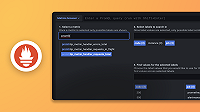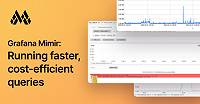This is documentation for the next version of Grafana Mimir documentation. For the latest stable release, go to the latest version.
About Grafana Mimir versioning
This topic describes our guarantees for this Grafana Mimir major release.
Flags, configuration, and minor version upgrades
Upgrading Grafana Mimir from one minor version to the next minor version should work, but we don’t want to bump the major version every time we remove a configuration parameter.
We will keep deprecated features in place for two minor releases.
You can use the deprecated_flags_inuse_total metric to generate an alert that helps you determine if you’re using a deprecated flag.
These guarantees don’t apply to experimental features.
Reading old data
The Grafana Mimir maintainers commit to ensuring that future versions can read data written by versions within the last two years. In practice, we expect to be able to read data written more than two years ago, but a minimum of two years is our guarantee.
API Compatibility
Grafana Mimir strives to be 100% compatible with the Prometheus HTTP API which is by default served by endpoints with the /prometheus HTTP path prefix /prometheus/*.
We consider any deviation from this 100% API compatibility to be a bug, except for the following scenarios:
- Additional API endpoints for creating, removing, modifying alerts, and recording rules.
- Additional APIs that push metrics (under
/prometheus/api/push). - Additional API endpoints for management of Grafana Mimir, such as the ring. These APIs are not included in any compatibility guarantees.
- Delete series API.
Experimental features
Grafana Mimir is an actively developed project and we encourage the introduction of new features and capabilities. Not everything in each release of Grafana Mimir is considered production-ready. We mark as “Experimental” all features and flags that we don’t consider production-ready.
We do not guarantee backwards compatibility for experimental features and flags. Experimental configuration and flags are subject to change.
The following features are currently experimental:
- Cost attribution
- Configure labels for cost attribution
-validation.cost-attribution-labels-structured
- Configure cost attribution limits, such as cardinality:
-validation.max-cost-attribution-cardinality
- Configure cooldown periods and eviction intervals for cost attribution
-validation.cost-attribution-cooldown-cost-attribution.eviction-interval
- Configure the metrics endpoint dedicated to cost attribution
-cost-attribution.registry-path
- Configure the cost attribution cleanup process run interval
-cost-attribution.cleanup-interval
- Configure labels for cost attribution
- Alertmanager
- Enable a set of experimental API endpoints to help support the migration of the Grafana Alertmanager to the Mimir Alertmanager.
-alertmanager.grafana-alertmanager-compatibility-enabled
- Health check grace period for connections to other replicas (
-alertmanager.alertmanager-client.health-check-grace-period)
- Enable a set of experimental API endpoints to help support the migration of the Grafana Alertmanager to the Mimir Alertmanager.
- Compactor
- Limit blocks processed in each compaction cycle. Blocks uploaded prior to the maximum lookback aren’t processed.
-compactor.max-lookback
- Limit blocks processed in each compaction cycle. Blocks uploaded prior to the maximum lookback aren’t processed.
- Ruler
- Allow defining limits on the maximum number of rules allowed in a rule group by namespace and the maximum number of rule groups by namespace. If set, this supersedes the
-ruler.max-rules-per-rule-groupand-ruler.max-rule-groups-per-tenantlimits. -ruler.max-rules-per-rule-group-by-namespace-ruler.max-rule-groups-per-tenant-by-namespace- Allow protecting rule groups from modification by namespace. Rule groups can always be read, and you can use the
X-Mimir-Ruler-Override-Namespace-Protectionheader with namespace names as values to override protection from modification. -ruler.protected-namespaces- Allow control over independent rules to be evaluated concurrently as long as they exceed a certain threshold on their rule group last duration runtime against their interval. We have both a limit on the number of rules that can be executed per ruler and per tenant:
-ruler.max-independent-rule-evaluation-concurrency-ruler.max-independent-rule-evaluation-concurrency-per-tenant-ruler.independent-rule-evaluation-concurrency-min-duration-percentage-ruler.rule-evaluation-write-enabled- Allow control over rule sync intervals.
ruler.outbound-sync-queue-poll-intervalruler.inbound-sync-queue-poll-interval
-ruler.min-rule-evaluation-interval- Configure metric and label name validation scheme
-validation.name-validation-scheme
- Health check grace period for connections to other replicas (
-ruler.client.health-check-grace-period)
- Allow defining limits on the maximum number of rules allowed in a rule group by namespace and the maximum number of rule groups by namespace. If set, this supersedes the
- Distributor
- Influx ingestion
/api/v1/push/influx/writeendpoint-distributor.influx-endpoint-enabled-distributor.max-influx-request-size
- Limit exemplars per series per request
-distributor.max-exemplars-per-series-per-request
- Limit OTLP write request byte size
-distributor.max-otlp-request-size
- Enforce a maximum pool buffer size for write requests
-distributor.max-request-pool-buffer-size
- Enable conversion of OTel start timestamps to Prometheus zero samples to mark series start
-distributor.otel-created-timestamp-zero-ingestion-enabled
- Promote a certain set of OTel resource attributes to labels
-distributor.otel-promote-resource-attributes
- Allow keeping OpenTelemetry
service.instance.id,service.nameandservice.namespaceresource attributes intarget_infoon top of converting them to theinstanceandjoblabels.-distributor.otel-keep-identifying-resource-attributes
- Enable conversion of OTel explicit bucket histograms into native histograms with custom buckets.
-distributor.otel-convert-histograms-to-nhcb
- Enable promotion of OTel scope metadata to metric labels
-distributor.otel-promote-scope-metadata
- Enable native ingestion of delta OTLP metrics. This means storing the raw delta sample values without converting them to cumulative values and having the metric type set to “Unknown”. Delta support is in an early stage of development. The ingestion and querying process is likely to change over time. You can find considerations around querying and gotchas in the corresponding Prometheus documentation.
distributor.otel-native-delta-ingestion
- Configure metric and label name validation scheme
-validation.name-validation-scheme
- Configure metric and label name translation strategy in OTLP endpoint
-distributor.otel-translation-strategy
- Configure how to handle label values over the length limit
-validation.label-value-length-over-limit-strategy
- Ingester health check grace period (
-distributor.ingester-health-check-grace-period)
- Influx ingestion
- Ingester
- Add variance to chunks end time to spread writing across time (
-blocks-storage.tsdb.head-chunks-end-time-variance) - Snapshotting of in-memory TSDB data on disk when shutting down (
-blocks-storage.tsdb.memory-snapshot-on-shutdown) - Out-of-order samples ingestion (
-ingester.out-of-order-time-window) - Shipper labeling out-of-order blocks before upload to cloud storage (
-ingester.out-of-order-blocks-external-label-enabled) - Early TSDB Head compaction to reduce in-memory series:
-blocks-storage.tsdb.early-head-compaction-min-in-memory-series-blocks-storage.tsdb.early-head-compaction-min-estimated-series-reduction-percentage
- Per-tenant early TSDB Head compaction based on owned series count:
-ingester.early-head-compaction-owned-series-threshold-ingester.early-head-compaction-min-estimated-series-reduction-percentage
- Timely head compaction (
-blocks-storage.tsdb.timely-head-compaction-enabled) - Count owned series and use them to enforce series limits:
-ingester.track-ingester-owned-series-ingester.use-ingester-owned-series-for-limits-ingester.owned-series-update-interval
- Per-ingester circuit breaking based on requests timing out or hitting per-instance limits
-ingester.push-circuit-breaker.circuit-breaker.enabled-ingester.push-circuit-breaker.failure-threshold-percentage-ingester.push-circuit-breaker.failure-execution-threshold-ingester.push-circuit-breaker.thresholding-period-ingester.push-circuit-breaker.cooldown-period-ingester.push-circuit-breaker.initial-delay-ingester.push-circuit-breaker.request-timeout-ingester.read-circuit-breaker.circuit-breaker.enabled-ingester.read-circuit-breaker.failure-threshold-percentage-ingester.read-circuit-breaker.failure-execution-threshold-ingester.read-circuit-breaker.thresholding-period-ingester.read-circuit-breaker.cooldown-period-ingester.read-circuit-breaker.initial-delay-ingester.read-circuit-breaker.request-timeout
- Reactive concurrency limiters
-distributor.reactive-limiter.enabled-distributor.reactive-limiter.min-limit-distributor.reactive-limiter.max-limit-distributor.reactive-limiter.initial-limit-distributor.reactive-limiter.max-limit-factor-distributor.reactive-limiter.recent-window-min-duration-distributor.reactive-limiter.recent-window-max-duration-distributor.reactive-limiter.recent-window-min-samples-distributor.reactive-limiter.recent-quantile-distributor.reactive-limiter.baseline-window-age-distributor.reactive-limiter.correlation-window-distributor.reactive-limiter.initial-rejection-factor-distributor.reactive-limiter.max-rejection-factor-ingester.push-reactive-limiter.enabled-ingester.push-reactive-limiter.min-limit-ingester.push-reactive-limiter.max-limit-ingester.push-reactive-limiter.initial-limit-ingester.push-reactive-limiter.max-limit-factor-ingester.push-reactive-limiter.recent-window-min-duration-ingester.push-reactive-limiter.recent-window-max-duration-ingester.push-reactive-limiter.recent-window-min-samples-ingester.push-reactive-limiter.recent-quantile-ingester.push-reactive-limiter.baseline-window-age-ingester.push-reactive-limiter.correlation-window-ingester.push-reactive-limiter.initial-rejection-factor-ingester.push-reactive-limiter.max-rejection-factor-ingester.read-reactive-limiter.enabled-ingester.read-reactive-limiter.min-limit-ingester.read-reactive-limiter.max-limit-ingester.read-reactive-limiter.initial-limit-ingester.read-reactive-limiter.max-limit-factor-ingester.read-reactive-limiter.recent-window-min-duration-ingester.read-reactive-limiter.recent-window-max-duration-ingester.read-reactive-limiter.recent-window-min-samples-ingester.read-reactive-limiter.recent-quantile-ingester.read-reactive-limiter.baseline-window-age-ingester.read-reactive-limiter.correlation-window-ingester.read-reactive-limiter.initial-rejection-factor-ingester.read-reactive-limiter.max-rejection-factor-ingester.rejection-prioritizer.calibration-interval
- Postings for matchers cache sharing and invalidation. Sharing allows caches to be shared across multiple TSDBs. Invalidation allows cache entries to be marked as invalid, after which they’ll be lazily evicted when they hit their normal TTL or when the cache hits its max size.
-blocks-storage.tsdb.shared-postings-for-matchers-cache-blocks-storage.tsdb.head-postings-for-matchers-cache-invalidation-blocks-storage.tsdb.head-postings-for-matchers-cache-versions
- Index lookup planning comparison to validate planning correctness
-blocks-storage.tsdb.index-lookup-planning-enabled-blocks-storage.tsdb.index-lookup-planning-comparison-portion
- Per-tenant max number of active series additional custom trackers is configurable via
-validation.max-active-series-additional-custom-trackers. - File based Kafka consumer group offset tracking enforcement
-ingest-storage.kafka.consumer-group-offset-commit-file-enforced
- Add variance to chunks end time to spread writing across time (
- Querier
- Max concurrency for tenant federated queries (
-tenant-federation.max-concurrent) - Mimir query engine (
-querier.query-engineand-querier.enable-query-engine-fallback, and all flags beginning with-querier.mimir-query-engine) - Maximum estimated memory consumption per query limit (
-querier.max-estimated-memory-consumption-per-query) - Enable the experimental Prometheus feature for delayed name removal (
-querier.enable-delayed-name-removal) - Ignore deletion marks while querying delay (
-blocks-storage.bucket-store.ignore-deletion-marks-while-querying-delay) - Querier ring (all flags beginning with
-querier.ring) - Query-frontend health check grace period (
-querier.frontend-client.health-check-grace-period) - Store-gateway health check grace period (
-querier.store-gateway-client.health-check-grace-period) - Ingester health check grace period (
-distributor.ingester-health-check-grace-period)
- Max concurrency for tenant federated queries (
- Query-frontend
- Lower TTL for cache entries overlapping the out-of-order samples ingestion window (re-using
-ingester.out-of-order-windowfrom ingesters) - Sharding of active series queries (
-query-frontend.shard-active-series-queries) - Server-side write timeout for responses to active series requests (
-query-frontend.active-series-write-timeout) - Blocking HTTP requests on a per-tenant basis (configured with the
blocked_requestslimit) - Spinning off (as actual range queries) subqueries from instant queries (
-query-frontend.subquery-spin-off-enabledand thesubquery_spin_off_enabledper-tenant limit) - Support for cluster validation via
-query-frontend.client-cluster-validation.labelor-common.client-cluster-validation.label. Requests with invalid cluster validation labels are tracked via thecortex_client_invalid_cluster_validation_label_requests_totalmetric. - Support for duration expressions in PromQL, which are simple arithmetics on numbers in offset and range specification.
- Support for configuring the maximum series limit for cardinality API requests on a per-tenant basis via
cardinality_analysis_max_results. - Mimir query engine (
-query-frontend.query-engineand-query-frontend.enable-query-engine-fallback) - Remote execution of queries in queriers:
-query-frontend.enable-remote-execution=trueand-query-frontend.enable-multiple-node-remote-execution-requests=true - Performing query sharding within MQE:
-query-frontend.use-mimir-query-engine-for-sharding=true - Computing multiple aggregations over the same data without buffering:
-querier.mimir-query-engine.enable-multi-aggregation=true - Rewriting of queries to optimize processing:
-query-frontend.rewrite-histogram-queriesand-query-frontend.rewrite-propagate-matchers - Enable experimental Prometheus extended range selector modifiers
smoothedandanchored(-query-frontend.enabled-promql-extended-range-selectors=smoothed,anchored) - Experimental PromQL functions and aggregations, including
mad_over_time,ts_of_min_over_time,ts_of_max_over_time,ts_of_first_over_time,ts_of_last_over_time,sort_by_label,sort_by_label_desc,limitkandlimit_ratio(-query-frontend.enabled-promql-experimental-functions=...)
- Lower TTL for cache entries overlapping the out-of-order samples ingestion window (re-using
- Query-scheduler
-query-scheduler.querier-forget-delay
- Store-gateway
- Eagerly loading some blocks on startup even when lazy loading is enabled
-blocks-storage.bucket-store.index-header.eager-loading-startup-enabled - Allow more than the default of 3 store-gateways to own recent blocks
-store-gateway.dynamic-replication - Per-zone shard size, useful for computing automatic shard sizes based on the number of zone
-store-gateway.tenant-shard-size-per-zone
- Eagerly loading some blocks on startup even when lazy loading is enabled
- Metric separation by an additionally configured group label
-validation.separate-metrics-group-label-max-separate-metrics-groups-per-user
- Vault
- Fetching TLS secrets from Vault for various clients (
-vault.enabled) - Vault client authentication token lifetime watcher. Ensures the client token is always valid by renewing the token lease or re-authenticating. Includes the metrics:
cortex_vault_token_lease_renewal_activecortex_vault_token_lease_renewal_success_totalcortex_vault_auth_success_total
- Fetching TLS secrets from Vault for various clients (
- Timeseries Unmarshal caching optimization in distributor (
-timeseries-unmarshal-caching-optimization-enabled) - Reusing buffers for marshalling write requests in distributors (
-distributor.write-requests-buffer-pooling-enabled) - Logging of requests that did not send any HTTP request:
-server.http-log-closed-connections-without-response-enabled. - Ingester: track “owned series” and use owned series instead of in-memory series for tenant limits.
-ingester.use-ingester-owned-series-for-limits-ingester.track-ingester-owned-series-ingester.owned-series-update-interval
- Server
- PROXY protocol support
-server.proxy-protocol-enabled
- Cross-cluster validation support for gRPC and HTTP communication
-server.cluster-validation.label-server.cluster-validation.grpc.enabled-server.cluster-validation.grpc.soft-validation-server.cluster-validation.http.enabled-server.cluster-validation.http.soft-validation-server.cluster-validation.http.excluded-paths- Requests with invalid cluster validation labels are tracked via the
cortex_server_invalid_cluster_validation_label_requests_totalmetric.
- PROXY protocol support
- gRPC clients
- Cross-cluster validation support for gRPC communication:
- Assuming that a gRPC client configuration can be reached via
-<grpc-client-config-path>, cluster validation label is configured via:-<grpc-client-config-path>.cluster-validation.label. - The cluster validation label of all gRPC clients can be configured via
-common.client-cluster-validation.label. - Requests with invalid cluster validation labels are tracked via the
cortex_client_invalid_cluster_validation_label_requests_totalmetric.
- Assuming that a gRPC client configuration can be reached via
- Cross-cluster validation support for gRPC communication:
- Common
- Instrument a fraction of pooled objects for references that outlive their lifetime.
- Only implemented for objects embedding
mimirpb.BufferHolder. - Flags:
-common.instrument-reference-leaks.percentage-common.instrument-reference-leaks.before-reuse-period-common.instrument-reference-leaks.max-inflight-instrumented-bytes
- Only implemented for objects embedding
- Instrument a fraction of pooled objects for references that outlive their lifetime.
- Preferred available zones for querying ingesters and store-gateways
-querier.prefer-availability-zones
- Memberlist zone-aware routing
-memberlist.zone-aware-routing.enabled-memberlist.zone-aware-routing.instance-availability-zone-memberlist.zone-aware-routing.role
- Memberlist rejoin custom seed nodes
-memberlist.rejoin-seed-nodes
- Jsonnet
$._config.autoscaling_oom_protection_enabledcontrols whether to add extra KEDA ScaledObject trigger to prevent from down-scaling during OOM kills, if memory trigger is disabled
Deprecated features
Deprecated features are usable up until the release that indicates their removal. For details about what deprecated means, see Parameter lifecycle.
The following features or configuration parameters are currently deprecated and will be removed in a future release (to be announced):
- Tracing configuration through Jaeger
JAEGER_*environment variables and Jaeger tracing exposition protocol (deprecated since Mimir 2.17)- Use OpenTelemetry configuration instead, as Jaeger supports OTLP ingestion natively
- Rule group configuration file
evaluation_delayfield: usequery_offsetinstead
- The
-store-gateway.sharding-ring.auto-forget-enabledis deprecated and will be removed in a future release. Set the-store-gateway.sharding-ring.auto-forget-unhealthy-periodsflag to 0 to disable the auto-forget feature. Deprecated since Mimir 2.17. - The
-distributor.otel-start-time-quiet-zeroparameter no longer has any effect and will be removed in a future release. Deprecated since Mimir 3.0. - Postings for matchers cache size (number of entries) configuration:
-blocks-storage.tsdb.head-postings-for-matchers-cache-size-blocks-storage.tsdb.block-postings-for-matchers-cache-size
The following features or configuration parameters were deprecated in Mimir 3.1 and will be removed in Mimir 3.3:
- Considering cached results when calculating the number of processed samples reported in query stats (
-query-frontend.cache-samples-processed-stats=true).


